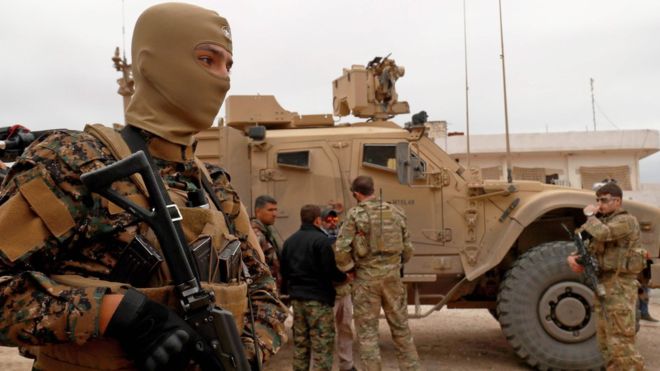
Casey McShea, Staff Writer|
Last December, President Donald Trump announced, via Twitter, that he was ordering his staff to execute a “full” and “rapid” withdrawal of United States troops from Syria, declaring the United States had defeated ISIS.
“We have won against ISIS,” Trump declared in a video released in a tweet. “We’ve beaten them and we’ve beaten them badly. We’ve taken back the land and now it’s time for our troops to come back home.”
The decision surprised many, as it was an abrupt reversal from previously stated United States policy. It sparked rebukes, rebuttals, and warnings of intensified congressional oversight. South Carolina Senator, Lindsey Graham, a Republican and Trump ally, said Trump’s decision was “Obama-like,” referencing President Obama’s decision to pull troops out of Iraq in 2011, which critics say gave rise to ISIS. Graham said the role of Congress is “to make administrations explain their policy, not in a tweet, but before Congress answering questions.”
Graham is not the only one who disputed the decision. Senate Republicans and Trump are very divided when it comes to the withdrawal. Senator Ron Johnson, chairman of the Homeland Security Committee and member of the Foreign Relations Committee, said that Republican senators “have been sending very strong signals to the president” to not make an abrupt withdrawal from the country. He continued, saying, “They want democracy, they want peace. Just having American military present, not even involved in the fighting, but as advisers, does a great deal for providing peace and stability for that part of Syria.”
International allies of the U.S. were blindsided by the announcement, as well. Tobias Ellwood, a minister in the British Ministry of Defense, said in a tweet that he “strongly” disagrees with Trump’s comment that ISIS had been defeated. “It has morphed into other forms of extremism and the threat is very much alive,” Ellwood wrote.
As of December, the U.S. has about 2,000 troops in Syria, where they are primarily training local forces to combat ISIS. There has been some recent success against the terror group and the combined US-backed and Kurdish-led Syrian Democratic Forces are on the cusp of capturing the last major town held by ISIS east of the Euphrates. White House spokeswoman Sarah Sanders said in a statement: “We have started returning United States troops home as we transition to the next phase of this campaign.” She added that United States victories didn’t signal an end of the global coalition on ISIS or its campaign.
On Friday, February 1, Trump acknowledged the possibility that ISIS and other terror groups could regain their strength in Syria and Afghanistan if he withdraws or reduces troops in those countries and noted that he would send United States forces back if they did.
“We’ll come back if we have to,” Trump said in an interview with CBS’s ‘Face the Nation’ host Margaret Brennan, “We have very fast airplanes, we have very good cargo planes. We can come back very quickly, and I’m not leaving. We have a base in Iran and the base is a fantastic edifice. I mean, I was there recently, and I couldn’t believe the money that was spent on these massive runways. And these—I’ve rarely seen anything like it.”
The Pentagon has warned that ISIS could re-emerge and take back territory in Syria within months if the U.S. does not maintain military pressure on the terror group. An official report is set to be published next week, and is expected to state that ISIS could regain territory within six months to a year of a U.S. withdrawal.
Leave a Reply